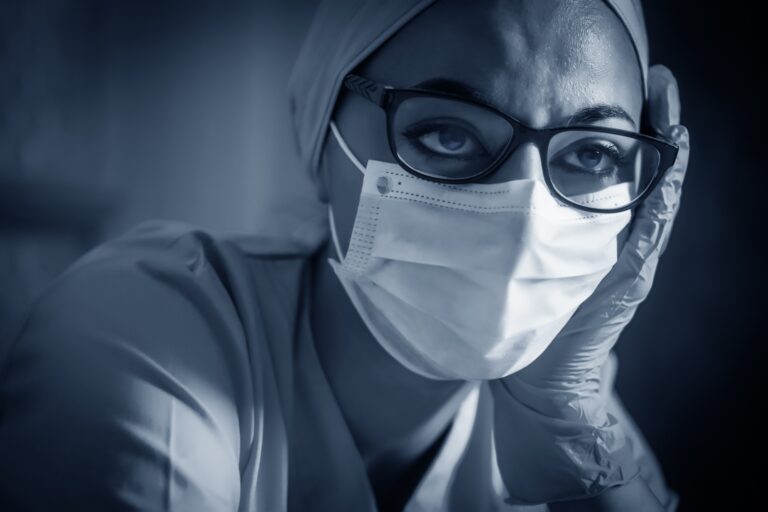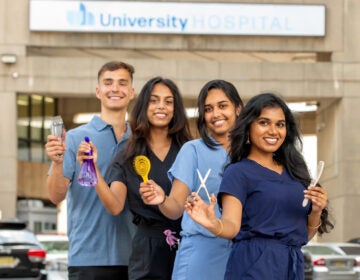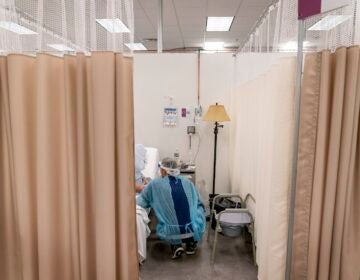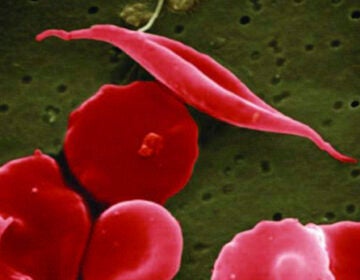For some new doctors, the pandemic means more responsibility with less training
As some hospitals became overwhelmed during the early days of the pandemic, educational requirements for residents in especially hard-hit regions were suspended.
Listen 7:15
As some hospitals became overwhelmed during the early days of the pandemic, educational requirements for residents in especially hard-hit regions were suspended. (Alexandru Nika / Big Stock Photo)
This story is from The Pulse, a weekly health and science podcast.
Subscribe on Apple Podcasts, Stitcher or wherever you get your podcasts.
If you ever wondered what it’s like to be a doctor fresh out of med school, Andy Hyatt, a third-year psychiatry resident at Cambridge Health Alliance in Boston, recommends watching the TV show “Scrubs.”
“I think it actually does a reasonably good job,” he said.
The show portrays the mandatory training period for American doctors as a “suckfest.” Work hours are notoriously grueling, and the pay isn’t much better.
As the Massachusetts representative for the national residents union, Hyatt was trying to make residency suck less. Then COVID-19 happened.
“We were going to revisit the whole contract and open negotiations when, you know, of course, we had a pandemic of historic proportions and no one had the capacity to do anything,” Hyatt said.
Everyone at his hospital jumped into action. The intensive care unit was sent into a frenzy. Dentists were called in to help answer phones. But as things started to plateau, Hyatt noticed a pattern.
“A lot of the more experienced physicians or people who had more outpatient practices, they just stopped seeing patients in person, and it became the case that most of the people who were seeing patients face-to-face were the residents. And that was scary,” he said.
But Hyatt wasn’t surprised that in the face of this unknown, contagious, deadly illness, the least experienced doctors were relied on the most. That’s because residents tend to run the show in many big hospitals around the country, he said — pandemic or not.
“The secret … I’m not sure how many people realize this, but all these kind of big-name hospitals, the residents are the ones who are really running things,” said Hyatt. “Which is kind of really ironic, that it’s the people who are really taking care of most of the patients are people with anywhere from two weeks of residency training to a couple of years. They are, of course, supervised by attending physicians, but we’re the ones who were kind of doing most of the work.”
About 1 out of every 7 physicians in the United States is a medical resident or fellow, according to the Accreditation Council for Graduate Medical Education, or ACGME, the organization that sets requirements for residency programs in this country. That’s about 141,000 doctors-in-training whose programs were disrupted by the pandemic.
“We heard very early on that many of the organizations were struggling to provide both education and clinical care to their programs,” said Dr. John Combes, communications officer for ACGME.
As some hospitals became overwhelmed during the early days of the pandemic, Combes said, the balance between hands-on experience and training quickly shifted. Educational requirements in especially hard-hit regions were suspended, and residents were scheduled based on need, rather than specialty.
“We basically said it’s all hands on deck with freeing residents to move to wherever the institution needs them to take care of patients,” Combes said.
Subscribe to The Pulse
ACGME still kept basic requirements in place for those hospitals. The number of hours residents were allowed to work, 80 per week, remained unchanged, and supervision by senior physicians was still a must.
“We wanted to make sure that they were adequately supervised during that time, that they were trained in the use of PPE and infection control so that the residents can remain safe if they were moved to other services,” he said.
Despite those efforts, there were times where things just felt plain unsafe and unfair, some residents said.
“The pandemic hit, and all of a sudden, you know, the N95 masks were just gone,” said Spruha Magodia, a fourth-year resident in podiatric surgery at Temple University Hospital in Philadelphia. While those in the emergency department were outfitted with N95 masks, Magodia said, residents in other departments were left out.
“A lot of the OR staff, many nurses and all of the attendings all had it, but I remember us as residents having to like scrounge for N95 masks. And to this day, actually, there are several of us that have yet to actually have N95 masks,” she said.
Residents can file complaints with ACGME about working conditions or not getting enough training. Programs can lose accreditation for violating ACGME’s requirements if those complaints meet a certain threshold.
“We did hear from lots of residents. Most of them did not rise to the level of a complaint about a requirements violation,” Combes said. None of the complaints ACGME has received so far during the pandemic has risen to that level, he noted.
Hyatt said it can be tough for many residents to speak out.
“In a lot of hospitals, residents are afraid to report because, you know, you say a report’s anonymous, but residency programs often aren’t that big and, like in any workplace, like how anonymous is an anonymous report.” he said.
Some residents feel that the system is stacked against them, he said, and that it has been long before the pandemic.
Hyatt pointed to the 80-hour workweek, a maximum limit set by ACGME. It’s up to residents in his hospital to self-report working hours through a software program.
“If you report things that violate duty hours, it’ll give an error message back: Sorry, no, this violates duty hours, you actually can’t put this in because it couldn’t be true. So if you actually did work that time … like software won’t actually allow you to do it,” Hyatt said.
In combination with a national pandemic, the working conditions have left some residents feeling low. Magodia is on a wellness committee at her hospital, and she’s concerned.
“A lot of residents want to stay strong and don’t want to be seen as weak. So they don’t say anything, quite frankly, to their mentors or even to their peers,” she said. “And I think that has to change – that if you’re feeling burnt out, that has nothing to do with you being weak, you know?”
Both Hyatt and Magodia stressed that the pandemic has only reinforced their passion and appreciation for their jobs, patients, superiors, and hospitals. They just want to make things better for the residents to come.
“This is a good opportunity to really change the health care system on how it treats all of its workers,” said Magodia, “and really welcome an influx of people wanting to contribute during a time that has now become uncertain.”
WHYY is your source for fact-based, in-depth journalism and information. As a nonprofit organization, we rely on financial support from readers like you. Please give today.




![CoronavirusPandemic_1024x512[1]](https://whyy.org/wp-content/uploads/2020/03/CoronavirusPandemic_1024x5121-300x150.jpg)



